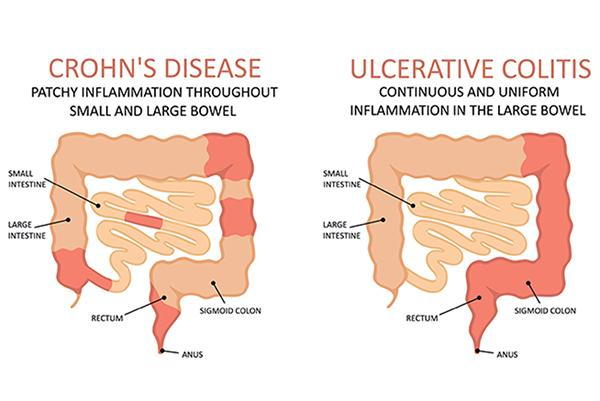
posted: Sep. 02, 2025.

Crohn’s disease and ulcerative colitis are both forms of inflammatory bowel disease (IBD), but they are not the same condition. While they share symptoms such as abdominal pain, diarrhea, and fatigue, important differences in where and how they affect the digestive tract shape diagnosis, treatment, and long-term outlook. Understanding these distinctions can help patients seek the right care sooner.
Where the Conditions Occur
Crohn’s disease may appear anywhere in the digestive tract, from the mouth to the anus. It most often involves the end of the small intestine (ileum) and the start of the large intestine, but its hallmark is patchy inflammation, with healthy tissue between affected areas.
Ulcerative colitis, by contrast, is limited to the rectum and colon. It typically begins in the rectum and progresses upward in a continuous pattern without skips.
Depth of Inflammation
Crohn’s disease often penetrates through multiple layers of the bowel wall. This deeper inflammation explains why complications such as strictures (narrowing), fistulas (abnormal passages), and abscesses are more frequent.
Ulcerative colitis, however, usually affects only the innermost lining of the colon. While this can still cause ulcers, bleeding, and discomfort, it is generally not as deep or transmural as Crohn’s disease.
Symptoms and Complications
Both conditions can produce abdominal cramping, diarrhea, bloody stool, and weight loss. Crohn’s disease often leads to malnutrition because the small intestine, responsible for nutrient absorption, is involved. Symptoms also tend to vary in intensity over time.
Ulcerative colitis, confined to the colon, is more strongly linked to ongoing bloody stools and carries a greater long-term risk of colon cancer.
Treatment Approaches
Treatment overlaps but must be customized. Medications such as anti-inflammatories, immunosuppressants, and biologics are used in both conditions.
Surgery plays different roles: in Crohn’s, it may manage complications but does not cure the disease; in ulcerative colitis, removing the colon can eliminate the disease, though it is reserved for severe or unresponsive cases.
Living With IBD
Both Crohn’s disease and ulcerative colitis are chronic conditions that need lifelong management. With proper treatment, many patients successfully control flares, reduce symptoms, and maintain quality of life. Regular follow-ups with a gastroenterologist and healthy lifestyle choices can make a lasting difference.






